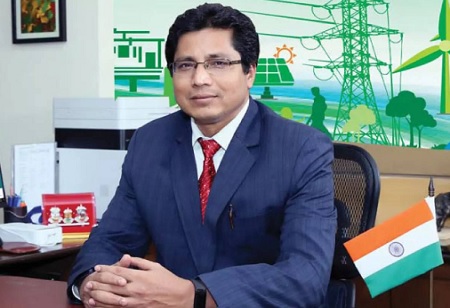
India Targets Rs 30 Lakh Crores for COP Pledges, Launches Rooftop Solar Scheme

 In a recent international webinar organized by the World Bank, Pradip Kumar Das, the Chairman and Managing Director (CMD) of the Indian Renewable Energy Development Agency Ltd. (IREDA), highlighted India's need for Rs 30 lakh crores in investments during the financial year 2024-2030 to meet its climate pledges under the COP framework.
In a recent international webinar organized by the World Bank, Pradip Kumar Das, the Chairman and Managing Director (CMD) of the Indian Renewable Energy Development Agency Ltd. (IREDA), highlighted India's need for Rs 30 lakh crores in investments during the financial year 2024-2030 to meet its climate pledges under the COP framework.
CMD Das emphasized the critical importance of substantial investments in various sectors, including manufacturing capacity for Solar, Electrolysers, Wind, and Battery; Transmission; Green Hydrogen; and Solar, Hydro, Wind, and Waste to Energy. These investments are crucial to achieving India's Nationally Determined Contributions (NDC) goals by 2030.
During his address, CMD Das also praised the newly launched "PM Surya Ghar Muft Bijli Yojana", a rooftop solar scheme with an investment exceeding Rs 75,000 crores. The initiative aims to provide up to 300 units of free electricity every month to 1 crore households, contributing to India's ambitious goals of achieving Net-Zero emissions by 2070 and Energy Independence by 2047.
CMD Das lauded India's progress in Renewable Energy development, citing initiatives like Renewable Purchase Obligations (RPO), PM-KUSUM scheme, 'Must-run' status for RE assets, PLI scheme for Solar PV manufacturing, and allowing up to 100 per cent FDI under the automatic route for renewable energy.
Highlighting India's commitment made at COP26 in 2021, CMD Das outlined the 'Panchamrit' pledge, including reaching 500 GW of non-fossil electricity capacity, generating half of all energy requirements from renewables, reducing emissions by 1 billion tonnes by 2030, and achieving net-zero emissions by 2070.
Union Minister RK Singh recently stated that about 44 per cent of India's current energy needs come from non-fossil sources, and this is expected to rise to as high as 65 per cent by 2030, surpassing the country's pledge at the COP summit in 2021. Singh highlighted the commitment to reducing the emissions intensity of GDP by 45 per cent.
CMD Das concluded by acknowledging the instrumental role played by IREDA in nurturing the Renewable Energy sector in India over the last 37 years. As India strives to become the third-largest economy in the next three years and a developed country by 2047, significant energy demand is anticipated, with approximately 90 per cent expected to be met through renewable sources. Until sufficient energy storage for renewable energy is achieved, thermal energy will also be developed alongside.